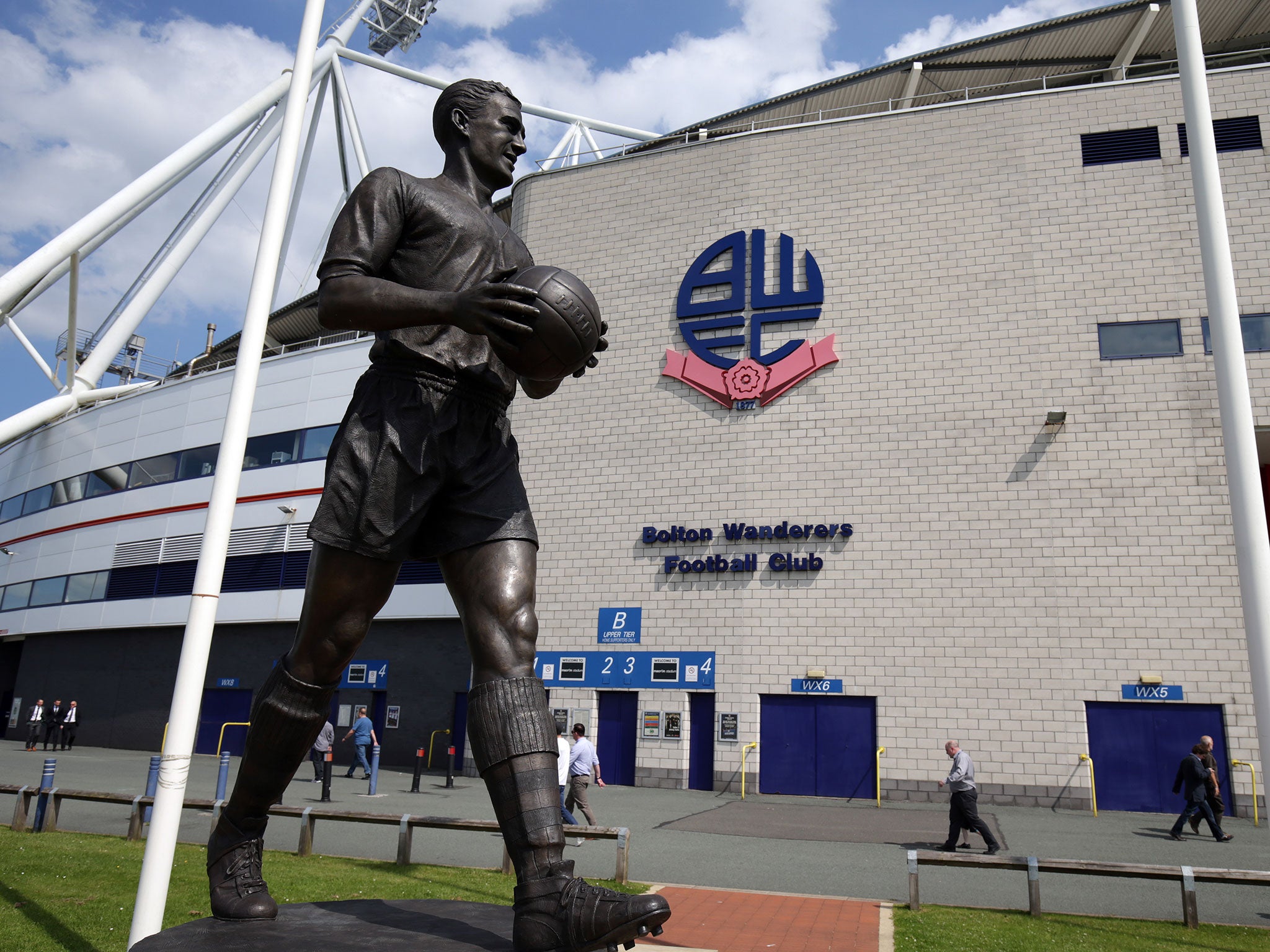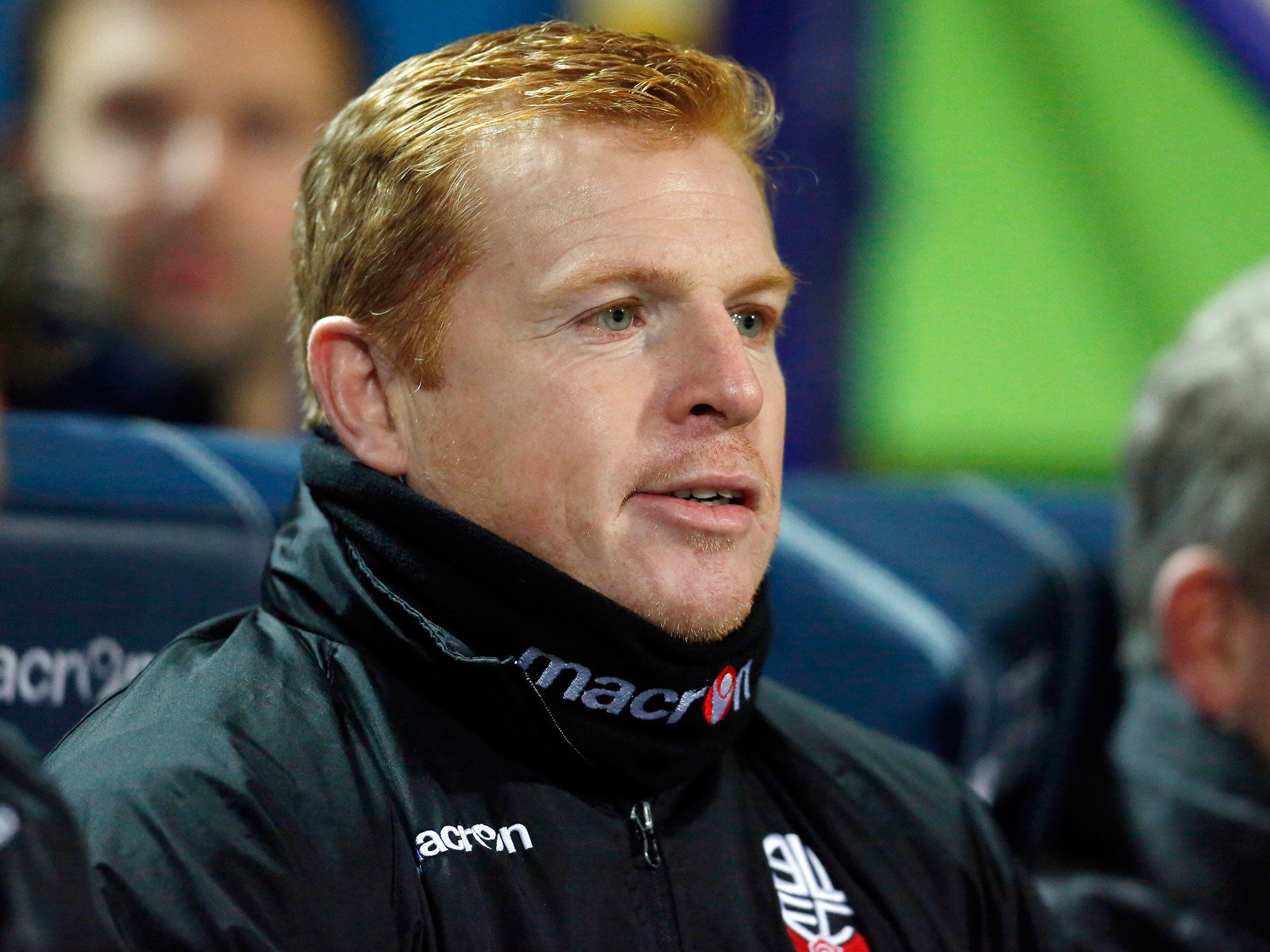As Bolton head towards administration, local sides Blackpool, Blackburn, Wigan and Burnley face similar problems
Once-highflying Bolton are heading into administration but they are not alone in being in peril in the Pennines, where post-Premier League financial problems are threatening a handful of clubs. Ian Herbert pays a visit to a troubled area

The evidence of a Premier League past is everywhere at Bolton Wanderers, killing the place by a thousand cuts with reminders of how far you can fall in football and how fast. There’s still an entire catalogue of merchandise for the club shop, which is the size of a small supermarket: official Bolton babywear, jackets, chocolate and sweets for a side who have still not been able to pay their players’ wages for November and, with running costs of £900,000 a month, are heading into administration within two weeks if a buyer cannot be found.
The managerial press conference routine is just the same as ever, too. You always needed to be an early riser for Sam Allardyce and Gary Megson’s 9am starts in the years when Bolton were punching way above their weight for a town with a population of 140,000 – drawing 2-2 at Bayern Munich in the Uefa Cup eight years ago last month and finishing sixth in the Premier League on the riches that businessman Eddie Davies made by manufacturing kettle thermostats. Journalists arrived in numbers back then, though when the engaging, intelligent Neil Lennon – the right man for this crisis, you have to feel – sat down to talk on Thursday, there were three of us in front of him. He drank tea from a “Hands Off My Bolton Mug”, another of those catalogue items, and navigated a treacherous path between diplomacy and honesty. He did not entirely hide the understandable indignation he feels that the club were heading to the precipice when he took the job in October last year, three months before Davies decided that 16 years and £172.9m of investment were quite enough and that he would be turning off the cash tap.
“I knew there was a debt, but I knew it was Mr Davies’ debt,” Lennon says, to the question of whether he was told enough by those who recruited him. “But the running costs of the club I would have assumed were in order. We’ve taken millions off the wage bill as well and that I would have thought would ease things a little bit. That’s not been the case, obviously. The problems have run deeper than maybe a lot of people thought…”
That Davies is not the most popular man in Bolton seems uncharitable, given the size of the investment. He won’t talk about this, maintaining the cloak of near invisibility he has always worn. The individual who runs the place for him, chairman Phil Gartside, is seriously ill. But their testimony is not required to state the obvious. Bolton exercised a catastrophic error of judgement in failing to cut their cloth after Premier League relegation and – by several accounts – have lacked any kind of urgency in their search for a buyer when Davies had made it clear he would be stepping away.

Several of those who expressed an interest in buying the club suggest they were told a deal was contingent on Gartside being allowed to remain on the board. “There was no movement for months,” says one. There are also suggestions Davies did not want a foreign buyer, preferring a Bolton fan like himself. In the meantime, the money ran out and the club adopted what people pursue when the bank refuses an overdraft extension, as Bolton’s did: high-interest arrangements. There was a £10m debenture loan from Nuclear Commercial Finance merchants, to go with £2m and £1.3m emergency short-term loans taken out by directors, with the ground as collateral.
Three weeks ago, Davies appointed the respected insolvency practitioner Trevor Birch, of BDO, to accelerate the search for a buyer, and is now willing to sell for a minimal sum. Though there are currently three seemingly serious contenders – consortiums led by ex-players Dean Holdsworth and Stelios Giannakopoulos and a third bid backed by Middle Eastern funds – Bolton are yet to see the colour of their money, so it is impossible to be confident about a rescue. “Nobody has put money on the table yet,” says Birch. “There is a big wage bill for the revenue the club is bringing in, which someone has to cover.”
The buyer will need an estimated £15m-£20m working capital to fund the club for the next nine months, plus the money to pay off those emergency loans. Such is the urgency, Birch may go with the first prospective buyer who shows the money. “We can’t afford to go with one preferred partner and find they can’t do the deal,” he says. “Middle East” might sound encouraging, but the size of the possible bids are thought roughly to equate.
This is an ignominious end for Davies. He’s not been every Bolton employee’s cup of tea down the years. Some will tell you that it’s been like receiving royalty when he arrives for a game. “When he’d been chauffeured to the ground there had to be particularly nice pasties,” says one. “People would be jumpy.” One former manager was reminded by Davies on one occasion to “remember who your boss is”. But it has been some ride he has provided: part of a wonderful era of football while it lasted within the old Lancashire county boundary. And to sustain it all, a river of red ink has been spilled in red rose country.
How much to spend? That’s the question.
From 2009 to 2011, the old county boundaries sustained four Premier League sides, though they were relegated in a hurry: Blackpool in 2011 after burning brightly and briefly; Blackburn Rovers and Bolton in 2012; Wigan Athletic in 2013. Burnley rose and fell twice, in 2010 and 2015. “You need to remember that while you have your pockets of wealth in Lancashire, around the Ribble Valley, it’s not an affluent county,” says a former chief executive of one of those clubs. “These are working-class towns with working-class salaries.” The modest populations made Premier League sustainability tough, too. Blackburn, a town of 120,000 people, attracted 25,000 average crowds after they were promoted alongside Bolton in 2001. Blackpool was similar: 142,000 population, 15,700 crowds. Burnley: 73,500 population, 19,100 crowds. Wigan: 97,000 population, 20,600 crowds. “We worked very hard on the commercial income,” says the former chief executive. “But it’s very difficult to survive without entrepreneurial backing.” That difficulty becomes a crisis when the side is relegated to the Championship. “In the Premier League, the size of the stadium and the attendances become less of a problem because of the TV money,” says Birch. “The problem when you are relegated to the Championship is the difficulty of getting out again and the huge diversity of clubs in there.”
Those Lancashire clubs always knew that once they dropped there might be no quick way back. Even with the continued financial support of elderly Dave Whelan – which will continue for the rest of his days, he says – Wigan have plummeted to a current fifth in League One.
Bereft of a big-money owner, Burnley’s plight – £8m losses – began to look precarious when the parachute payments from their first Premier League visit were due to run out, in 2014. Additional cash ploughed in by freight broker John Banaszkiewicz – “John B” as he is universally known at Turf Moor – helped steady things. Hence the frugal regime when they were briefly repromoted. Blackpool ran a tighter ship than any, making Ian Holloway’s achievements a miracle, before the Oyston family began stripping the club to nothing.
Blackburn cut their cloth after Jack Walker died but they had a very clear idea of the point where parsimony became treacherous. The club knew about the link between wages and a probable finishing place and always aimed to be the Premier League’s 12th or 13th highest wage spenders. The view from Ewood in those clear-sighted, pre-Venky’s years was always that paying the 16th or 17th highest salaries left too slim a safety margin. Three very good managers – Mark Hughes, Graeme Souness and Sam Allardyce – were then challenged by the board to finish one or two places higher than 12th.
It has been the wage bill that has kept the Lancashire clubs’ chief executives awake at night. “I slept with my wage bill,” says one former chief executive. “You want to spend the wages to survive but what does that do to your business in relation to your turnover?” Blackburn’s wages to turnover ratio peaked at 85 per cent.
Wages in a world Bolton don’t occupy
Bolton were less obsessed with arithmetic, though. In January last year they posted £50.7m losses for the post-relegation season. They were running a £35m wage bill; signing Keith Andrews at the age of 31 on a salary of over £20,000 a week after the club had dropped and increasing David Wheater’s pay, post-relegation, to around £20,000. The wages still don’t belong in the world Bolton occupy: Wheater and Mark Davies, remnants of the good old days, commanding around £16,000. So, too, goalkeeper, Ben Amos, such was the desperate need for reliability after Adam Bogdan went to Liverpool.
Lennon has taken the wage bill down to sub-£16m but, having recently thought he had secured the Wolverhampton Wanderers winger Van la Parra and Liverpool forward Joao Teixeira on loan, he learned the money was not there. “We were told we could bring the players in,” he says. “And then there was a change of direction – very, very quickly – and we were told there’s not money: ‘It stops now’.”
If there is any consolation for Bolton, then it is that the one-time ambitions of Davies and Gartside mean that the club delivers more development potential to new owners than, say, Everton, another in need of investment. The club wholly own their own hotel – the upmarket Whites, set within the stadium complex – and few can say that. Outline planning permission has been approved for land at Middlebrook, adjacent to the stadium. Offices within the stadium generate rent. Davies’ desire for a Centre of Excellence means that there is a wholly owned site at Lostock, as well as the training ground at Euxton which is the club’s.
It is the football which creates the problem. Bolton cannot buy a goal, much like anything else, with their tally of 12, before Cardiff’s arrival on Saturday, the Football League’s poorest return. The parachute payments run out at the end of this season and, under new League rules, simply to file a “notice of administration” would bring a 12-point deduction and almost certain relegation.
“There’s no question that for years we were punching well above our weight, you know,” Lennon reflects. “Well above our weight. They were great days, I’m sure. They’ll come again. It won’t be over the next two or three years but what we have to do now is build.” And he looked like he meant it. Up here in Lancashire Pennine country, though, it feels like one almighty climb.
Join our commenting forum
Join thought-provoking conversations, follow other Independent readers and see their replies
Comments